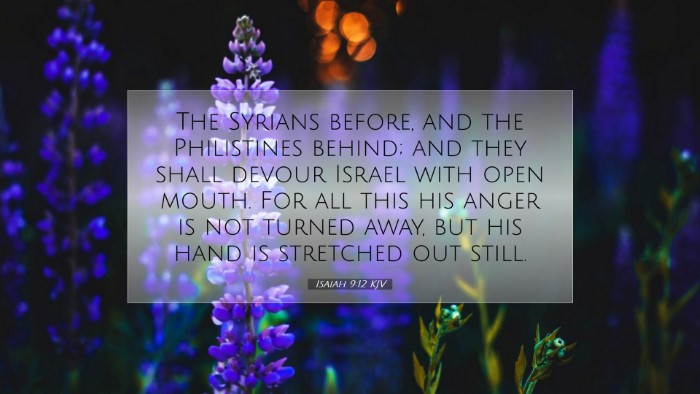Commentary on Isaiah 9:12
Verse: "The Syrians before, and the Philistines behind; and they shall devour Israel with open mouth. For all this his anger is not turned away, but his hand is stretched out still." (Isaiah 9:12)
Contextual Overview
Isaiah 9:12 is part of a larger prophetic discourse in which the prophet Isaiah communicates
the gravity of the circumstances faced by the people of Israel. The passage reveals the
relentless nature of God's judgment against Israel due to their persistent disobedience.
The geopolitical imagery of the Syrians and Philistines offers a vivid representation of
Israel's precarious situation, underscoring the threats from surrounding nations that
contributed to their anguish.
Interpretation and Insights
Historical Context
According to Matthew Henry, the historical backdrop of this verse is crucial to
understanding its significance. The kingdoms of Syria and Israel were embroiled in conflict,
and the Philistines were among Israel’s traditional enemies. Isaiah's prophecy serves
to highlight that danger encompassed Israel from all sides, symbolizing the inevitable
consequences of their sin.
Theological Implications
Albert Barnes emphasizes the theological weight of their troubles, asserting that
the invasions and conflicts act as instruments of divine judgment. The phrase "his anger is
not turned away" speaks to a God who, while just, desires repentance and restoration for
His people. The open mouth of the devouring nations suggests as well that these foes are
not only enemies of the nation, but their acts are emblematic of the spiritual condition of
Israel, falling into the jaws of their own rebellion.
Symbolic Representation
Adam Clarke comments on the symbolic implications of the nations mentioned. By
contrasting the geographical boundaries of Israel with the surrounding adversaries, it
highlights not simply a physical invasion, but a spiritual crisis. The aggressors signify
the pervasive reach of sin within the nation and the resulting judgment they face.
Application for Today
The resonance of Isaiah 9:12 extends beyond its immediate context and offers timeless
lessons for contemporary believers:
- Understanding Divine Judgment: Pastors and theologians are reminded
that God’s judgments, both corporate and individual, are manifestations of His holiness
and righteousness. They compel a search for personal and communal repentance.
- The Call for Repentance: The passage urges leaders within the Church
to examine whether societal struggles stem from within the community of faith itself.
- Encouragement in Trials: The imagery in this verse serves as a reminder
that although judgment is severe, God's hand remains outstretched, symbolizing the hope for
restoration even amidst crisis.
Conclusion
In summary, Isaiah 9:12 acts as a poignant reminder of Israel's historical struggles while
simultaneously serving as a theological reflection on the nature of God’s judgment.
The insights derived from the commentaries of Matthew Henry, Albert Barnes, and Adam Clarke
shed light on the pressing realities faced by Israel and the eternal truths applicable to
believers today. This passage not only calls for introspection but also offers hope, as it
underscores God's unwavering desire to redeem His people.


